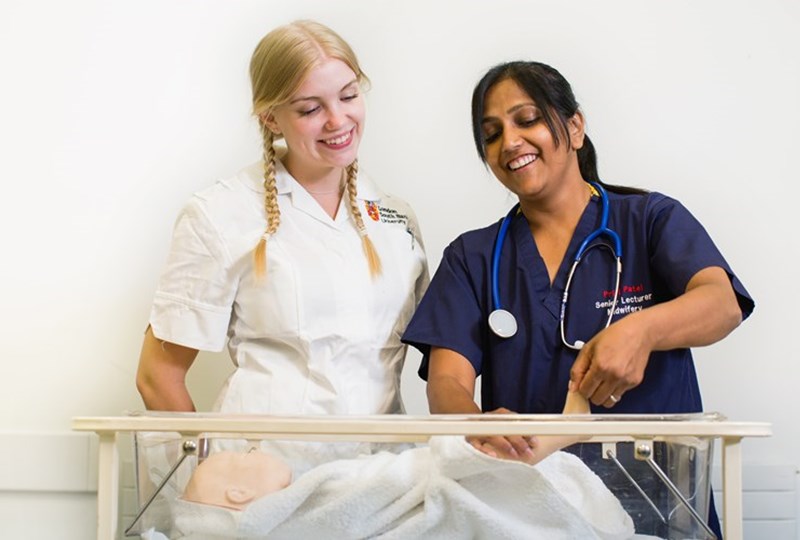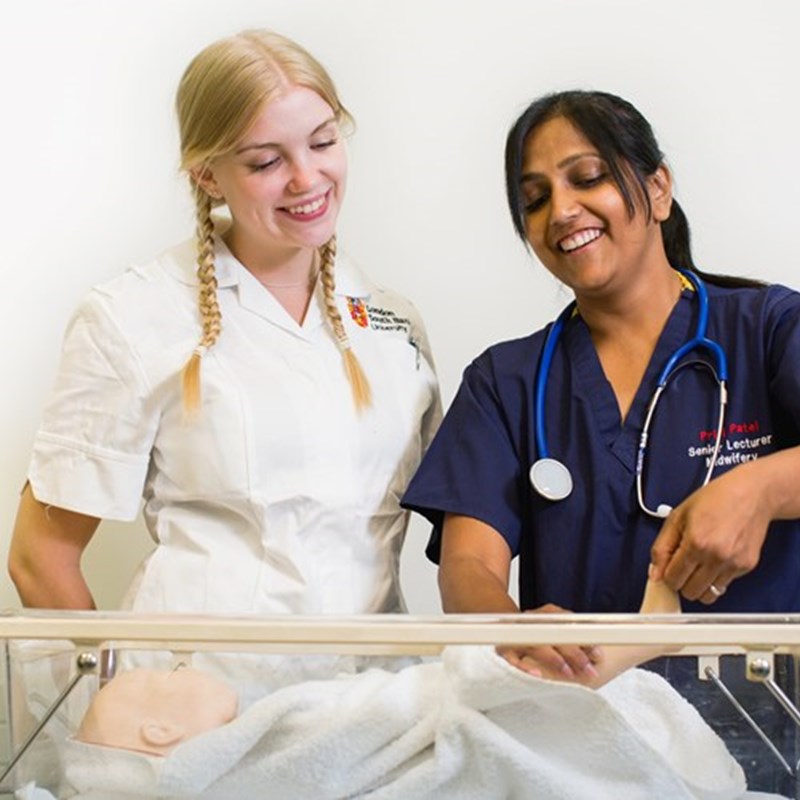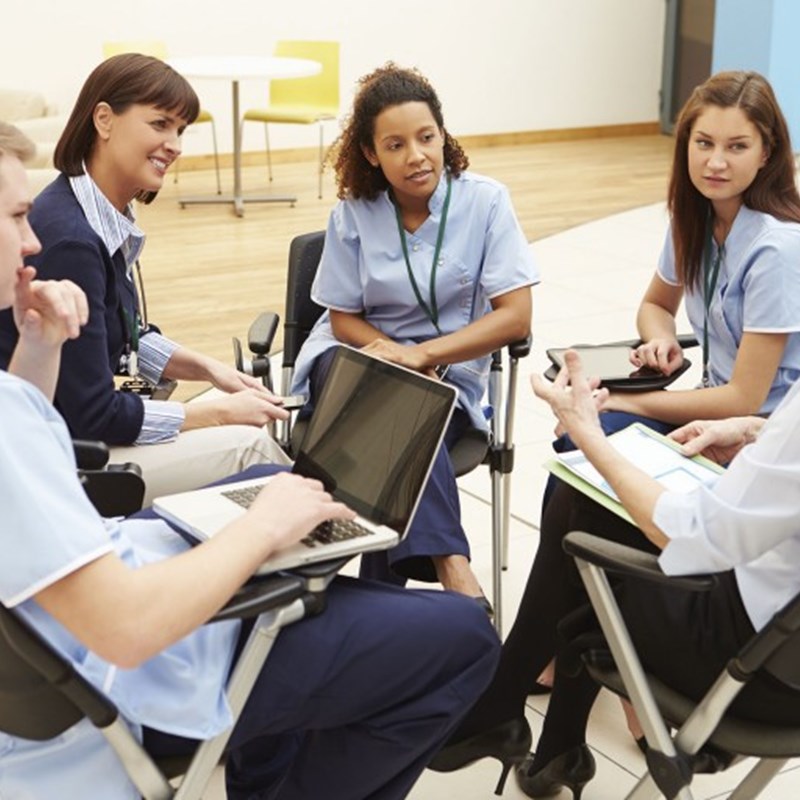
How to become a midwife in the UK
If you want to know more about how to become a midwife, then you’ve come to the right place. This section contains several in-depth articles about starting your journey into midwifery.
Becoming a midwife means undertaking professional education at degree level. Some midwives are qualified nurses who have chosen to change career direction and undertake the extra study necessary to be registered as a midwife. Others begin their career by working their way up via a range of roles, such as support roles that do not require qualifications, before going on to study for a registered midwifery degree.
Below are some useful resources to help you on on your journey to becoming a midwife in the UK:
A definition that sets out the role and responsibilities of a midwife on an international level has been agreed by the International Confederation of Midwives (ICM) (2005). This organisation represents the professional status of midwives worldwide.
Definition of the midwife
The word ‘midwife’ means ‘with woman’. A midwife is widely regarded to be a trained professional who assists women with pregnancy, childbirth and the postpartum period. The role of the midwife is diverse and includes supporting women and their families, providing information about how to maintain healthy pregnancies and carrying out clinical examinations.
Midwifery is a distinct profession and the title ‘midwife’ is protected by law. This means that ‘midwife’ can only be used by those who hold a qualification in midwifery and are registered with the Nursing & Midwifery Council (NMC).
Midwifery has historically been a female profession but there are an increasing number of male midwives in the UK. There are no gender or age restrictions and anyone can practice as a midwife as long as they have the appropriate training.
International Confederation of Midwives (ICM)
The ICM is an international organisation that supports midwives across the world. They have developed a definition of the midwife that is widely used by international organisations and professional bodies.
You can view the full definitions by clicking on the links below:
Being a midwife is an inspiring and immensely fulfilling role that requires a number of qualities including confidence, compassion and trust. Every day is different, bringing with it assorted experiences and challenges, and midwives need to have the skills to respond to all of these appropriately and competently.
The 6Cs
The NHS has championed the use of the 6Cs which are a core set of values for all midwives, nurses and health and social care staff. It is widely recognised that all midwives should possess the six values below:
- Care - delivering high quality care to patients
- Compassion - Building relationships based on empathy, kindness, respect and dignity
- Competence - Possessing the knowledge and skills to deliver the highest standards of care
- Communication - Effective listening skills and team working
- Courage - Having the strength to do the right thing and speak up when necessary
- Commitment - a commitment to make this vision a reality.
Other skills
It is important to remember that midwives draw upon a vast array of qualities and skills. In addition to the 6Cs, there are many other important personal qualities and skills needed to become a midwife including:
- Patience
- Maturity
- Good observation
- Emotional and mental strength
- Interest in pregnancy and childbirth
- Ability to maintain clear and accurate documentation
You can find more information about the qualities and skills needed to become a midwife by visiting the NHS Health Careers website.
Entry requirements for midwifery degree courses and degree apprenticeships tend to vary because each university and employer can set its own criteria.
Midwifery degree courses usually require three A levels or equivalent level 3 qualifications, in addition to GCSEs and evidence of literacy and numeracy. A levels or level 3 qualifications in the sciences tend to be preferred, and some universities require a qualification in biology.
Some universities will have broader entry requirements and accept alternatives such as access courses. For entry to midwifery courses, ‘Access to Health and Social Care’ courses are most applicable. Courses are available as both full- and part-time study and lead to the award of an Access to HE (Higher Education) Diploma, which is recognised by universities as a substitute for A levels. However, it is best to contact universities directly to find out if your qualifications meet the entry requirements.
If you are already registered as an adult nurse, you can apply for a shortened 18-month midwifery programme. To apply for this programme, you will usually need at least six months’ experience as a staff nurse. A list of universities that provide approved midwifery degree programmes and shortened 18-month programmes can be found on the Nursing & Midwifery Council website.
An alternative route into midwifery is taking a degree apprenticeship which combines on the job training with a recognised qualification. Apprentices will usually need to meet the entry requirements for the level 6 degree set by the university and any requirements set by individual employers. More information can be found on the Royal College of Midwives website.
The Nursing & Midwifery Council (NMC) has outlined the standards required for pre-registration midwifery degree programmes. You can find a list of all degree programmes that meet the required standards on the NMC website.
Pre-registration midwifery degree programmes are usually three years in length and each year involves 45 weeks of study. If you are already registered as an adult nurse, degree programmes are usually 18 months in length. Annual leave is often linked to periods of study, as well as being divided between Christmas, Easter and summer breaks.
Pre-registration midwifery degree programmes typically include both academic teaching and clinical practice. Most degree programmes split this into 50% academic teaching and 50% clinical practice. This combination of teaching and practice will enable you to learn about all aspects of antenatal, labour, postnatal and neonatal care.
Academic course content
Academic teaching tends to include a mixture of lectures, tutorials, workshops and case studies. Most academic modules are compulsory in the first two years, and then you may be able to choose some optional modules in your third year. Assessments may include exams, essays, presentations and online work.
Clinical placements
You will also be expected to participate in a number of clinical placements. This involves providing care for women and babies under the direct or indirect supervision of a qualified midwife. Indirect supervision is likely to take place when you have more experience, and when you can safely undertake complex duties.
You may be encouraged to take on a caseload, which involves continuously caring for a small number of women and attending most of their antenatal appointments, labour and birth, and postnatal visits. Providing continuity of care will enable you to build trusting and mutually respectful relationships with the women involved. You can listen to the experiences of midwives providing this care by visiting the Royal College of Midwives website.
Universities may offer placements covering a wide geographical area. Placements can usually be listed in order of preference, but some students may need to travel a considerable distance. It is important to find out where the locations are, particularly if you have family commitments or transport constraints. The various placement options are often listed on the university website.
You can find advice about placements on the NHS Health Careers website.
Qualifications
Students are usually awarded both an academic qualification (BSc (Hons)) and a professional qualification (RM). You must be successful in both your academic and clinical placements in order to complete your degree and qualify as a midwife.
Work experience
If you are interested in becoming a midwife and you have not had previous experience of giving direct care to someone with health needs, it might be an advantage to organise some form of experience in this area before applying for a course.
Some maternity units may offer the facility for you to spend a few days observing the work that midwives undertake. This can be a valuable way of gaining an insight into the demands of the job and building your confidence working in healthcare environments. The best way to arrange this is to contact your local NHS Foundation Trust and explain why you are interested in a career as a midwife. Alternatively, you might want to speak to the careers advisor at your school or college as they sometimes have existing arrangements with local NHS services.
It is important to remember that work experience is becoming increasingly uncommon where greater precautions are now taken to ensure the safety and security of women and their babies. As an alternative, it may be helpful to contact your local maternity unit and ask if you can speak to a midwife about their role.
If your personal circumstances allow this, another pathway is to find work in a health and social care setting. You might want to find work as a Health Care Assistant (HCA) under the guidance of healthcare professionals like nurses or midwives. This type of experience can help you gain a better understanding of healthcare provision and working within multidisciplinary teams. More information on HCAs can be found on the NHS Health Careers website.
If this is not possible, it may be useful to get involved in local support groups for pregnant women and new mothers, or find voluntary work that demonstrates your skills in communication and teamwork.
Research and reading
Another way to prepare for your application is to develop your knowledge of midwifery by reading relevant materials. You may be interested in reading articles from the MIDIRS Midwifery Digest, or articles from other publications such as the RCM Midwives magazine which is available to RCM members.
Loans and grants
Students on pre-registration midwifery degree courses in the UK can access tuition fee loans and maintenance loans. The loans provided are means tested and depend on your individual circumstances. For the 2021/2022 academic year, maintenance loans from Student Finance England range from £3,516 to £12,382.
There are some additional loans and grants that students can apply for under specific circumstances. For example, full-time healthcare students with children can claim an additional £2,000 Parental Support Allowance from the NHS Business Services Authority.
Students with dependants or particular learning needs may also be eligible for the following grants:
For more information on loans and grants in England, Scotland, Wales and Northern Ireland, please follow the links below:
Bursaries and scholarships
Universities often provide additional financial support in the form of bursaries and scholarships. Bursaries are usually available to students who face particular barriers to studying, and scholarships tend to reward academic potential or outstanding achievements in sports or music. It is best to check with your individual university to find out what support is available.
Some organisations like The Iolanthe Midwifery Trust also provide bursaries and awards for midwifery students. There are a range of awards available, including the Student Award and The Dora Opoku Student Award for Black and Brown students.
Applying for a course
Applications for degree programmes should be submitted through the University and College Admissions Service (UCAS) in the autumn of the year before the course starts. It is advisable to start your application as early as possible so you have time to proofread and make any amendments.
Applications usually require a personal statement outlining why you are interested in the course, and what ambitions, skills and experiences you have. Your personal statement is limited to 47 lines or 4,000 characters including spaces, so your writing must be detailed but concise. More information on how to write a personal statement can be found on the UCAS website.
It is important to visit the university before submitting your application so you know that the university and course are right for you. Most universities will have open days throughout the year, and you can usually speak to lecturers and current students about their experiences.
If you are not successful in being selected for interview, you should try to get some feedback from the university admissions team. This feedback may be useful if you attend an interview for another university, or if you decide to apply again the following year.
The interview
If you are invited for an interview, you are usually given a few weeks to prepare for it, and you should be given some information about what it will entail. Each university interview process is different, but most interviews will involve university lecturers and practising midwives asking you questions.
You should prepare for the interview by researching the university and course, and reading about current issues in the world of midwifery and healthcare.
You may be asked questions such as:
- Why do you want to become a midwife?
- Can you define the role of a midwife?
- What area of the course interests you the most?
- What are the current issues affecting midwifery?
- What do you know about the Nursing & Midwifery Council?
The interview may also involve personal questions about your skills and experiences. These questions may be based upon aspects of your personal statement.
You may be asked:
- How do you manage your time?
- Can you describe a time when you have worked well in a team?
- Can you describe a time when you took steps to make an improvement?
- How will you cope with the pressures of university work and placements?
- Have you done any work experience to prepare yourself for the course?
Overall, it is important to be prepared for the interview and remain calm and confident. Our top tips include:
- Have a clear understanding of the course content
- Keep a copy of your application form
- Be able to articulate why you want to become a midwife
- Answer questions in detail and avoid single word responses
- Be prepared to ask a few relevant questions about the course
The Clearing process
If you do not receive any university offers, or if you do not meet the conditions of your offers, you can sometimes apply for courses through the UCAS Clearing system. This is available between July and October, and you can apply for any course that still has places available. More information can be found on the UCAS website.
It is important to note that midwifery courses are usually competitive and there may only be a limited number of Clearing places available. You should make sure that any courses available are right for you, and sometimes it may be best to apply again the following year.
As part of the preparation for your application and interview, it is perhaps also important to know about life after registration. This will enable you to better appreciate what you are working towards, as well as understanding the status of the midwives who are teaching and supporting you.
Midwives working within the National Health Service (NHS) will fall under the NHS pay system known as Agenda for Change. This involves a standard working week of 37.5 hours and pay enhancements for out of hours, shift and overtime working. Some part-time contracts may be available, and some midwives prefer the flexibility of bank work. The latest information on pay and working environments can be found on the NHS Health Careers website.
Continuing professional development
The Nursing & Midwifery Council (NMC) requires all midwives and nurses to undertake 35 hours of continuing professional development (CPD) in the three-year period after joining the register or since registration was last renewed. CPD should usually involve activities or learning experiences that build upon your skills and knowledge as a midwife. Further information about CPD requirements can be found on the NMC website.
The Royal College of Midwives (RCM) i-learn resource has over 100 CPD courses that are free to members. RCM members can also access the i-folio resource which tracks CPD, career development and reflection. More information about both resources can be found on the RCM website.
RCM i-learn modules include:
- Midwifery continuity of carer: an introduction
- How to recognise maternal sepsis
- Human rights in maternity care: advocating for women
- Women in prison: birth charter for care
- Understanding asylum seekers and refugees
- Involving fathers in maternity care
Some universities also offer short CPD courses. These courses are usually delivered in a number of ways including face-to-face teaching and online learning.
Work abroad
Some midwives choose to work abroad after qualification. Midwives seeking work in a country outside of the UK will need to request a certificate of current professional status (CCPS) which costs £34. Further information can be found on the NMC website.
Organisations such as Médecins Sans Frontières (MSF) and Voluntary Service Overseas (VSO) offer opportunities for midwives to undertake humanitarian or development work abroad. These opportunities are often based in African and Asian countries, and typically require a minimum of 2 years’ post-qualification experience.

Get more information resources from just £4.41 a month!
Subscribe to MIDIRS




